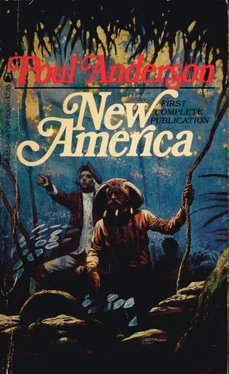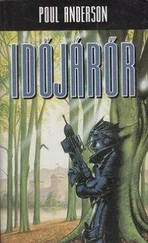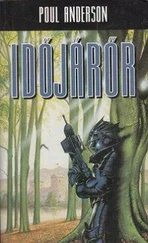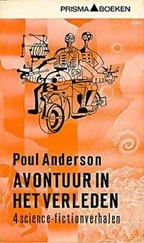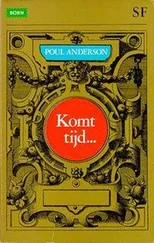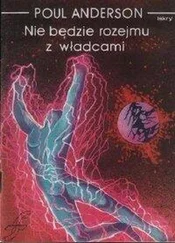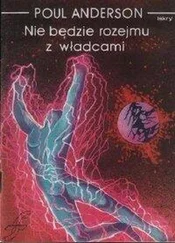He grew grave again: “Man also creates archetypes that are not individuals. The Anima, the Shadow—and, it seems, the Outworld. The world of magic, or glamour—which originally mean enchantment—of half-human beings, some like Ariel and some like Caliban, but each free of mortal frailties and sorrows—therefore, perhaps, a little carelessly cruel, more than a little tricksy; dwellers in dusk and moonlight, not truly gods but obedient to rulers who are enigmatic and powerful enough to be—Yes, our Queen of Air and Darkness knew well what sights to let lonely people see, what illusions to spin around them from time to time, what songs and legends to set going among them. I wonder how much she and her underlings gleaned from human fairy tales, how much they made up themselves, and how much men created all over again, all unwittingly, as the sense of living on the edge of the world entered them. ,,
Shadows stole across the room. It grew cooler and the traffic noises dwindled. Barbro asked mutedly, “But what could this do?”
“In many ways,” Sherrinford answered, “the outwayer is back in the Dark Ages. He has few neighbors, hears scanty news from beyond his horizon, toils to survive in a land he only partly understands, that may any night raise unforeseeable disasters against him, and is bounded by enormous wildernesses. The machine civilization which brought his ancestors here is frail at best. He could lose it as the Dark Ages nations had lost Greece and Rome, as the whole of Earth seems to have lost it. Let him be worked on, long, strongly, cunningly, by the archetypical Outworld, until he has come to believe in his bones that the magic of the Queen of Air and Darkness is greater than the energy of engines; and first his faith, finally his deeds will follow her. Oh, it wouldn’t happen fast. Ideally, it would happen too slowly to be noticed, especially by self-satisfied city people. But when in the end a hinterland gone back to the ancient way turned from them, how could they keep alive?”
Barbro breathed, “She said to me, when their banners flew in the last of our cities, we would rejoice.”
“I think we would have, by then,” Sherrinford admitted. “Nevertheless, I believe in choosing one’s destiny.”
He shook himself, as if casting off a burden. He knocked the dottle from his pipe and stretched, muscle by muscle. “Well,” he said, “it isn’t going to happen.”
She looked straight at him. “Thanks to you.”
A flush went up his thin cheeks. “In time, I’m sure, somebody else would have—What matters is what we do next, and that’s too big a decision for one individual or one generation to make.”
She rose. “Unless the decision is personal, Eric,” she suggested, feeling heat in her own face.
It was curious to see him shy. “I was hoping we might meet again.”
“We will.”
Ayoch sat on Wolund’s Barrow. Aurora shuddered so brilliant, in such vast sheafs of light, as almost to hide the waning moons. Firethorn blooms had fallen; a few still glowed around the tree roots, amidst dry brok which crackled underfoot and smelled like woodsmoke. The air remained warm, but no gleam was left on the sunset horizon.
“Farewell, fare lucky,” the pook called. Mistherd and Shadow-of-a-Dream never looked back. It was as if they didn’t dare. They trudged on out of sight, toward the human camp whose lights made a harsh new star in the south.
Ayoch lingered. He felt he should also offer good-bye to her who had lately joined him that slept in the dolmen. Likely none would meet here again for loving or magic. But he could only think of one old verse that might do. He stood and trilled:
“Out of her breast
a blossom ascended.
The summer burned it.
The song is ended.”
Then he spread his wings for the long flight away.
Like a bullet, but one that hunted its own target, the ferry left the mother ship and curved down from orbit. Stars crowded darkness, unwinking and wintry. Yakov Kahn’s gaze went out the viewpoint over the pilot board, across thirty-three light-years to the spark which was Sol. Almost convulsively, he looked away again, sought the clotted silver of the Milky Way and the sprawl of Sagittarius. There, behind dust clouds where new suns were being born, lay the galaxy’s heart.
Once he had dreamed of seeking thither himself. But he was a boy then, who stood on a rooftop and peered through city sky-glow and city haze, wanting only to be yonder. Afterward the dream struck facts of distance, energy, and economics. The wreck had not gone under in an instant. His sons, his grandsons—
No. Probably no man ever would.
Beside him, Bill Redfeather’s craggy features scowled at instruments. “All systems check,” he reported.
Kahn’s mouth twitched slightly upward. “I should hope so.”
Redfeather looked irritated. It was the pilot’s, not the co-pilot’s, responsibility to be sure they wouldn’t burn as a meteorite in the atmosphere of the planet.
Its night side swelled before them, a monstrous darkness when you remembered the lights of Earth, but rimmed to dayward with blue and rosy red. An ocean sheened, polished metal scutcheoned with a hurricane; and that was alien too, no pelagicultural cover, no floating towns or crisscrossing transport webs. As he watched how Kahn regarded the sight, Redfeather’s mood turned gentle.
“You think too damn much, Jake,” he said.
“Well—” Kahn shrugged. “My last space trip.”
“Nonsense. They’ll need men yet on the Lunar run.”
“A nice, safe shuttle.” Kahn’s Israeli accent harshened his English. “No, thank you. I will make a clean break and stay groundside. High time I began raising a family anyway.”
If I can find a girl Almost seventy years will have passed since we started out And even then I was an anachronism, too many missions to too many stars…. Cut that! No self-pity allowed.
“I wonder what they’ve become like,” Red-feather said.
“Eh?” Kahn pulled himself out of his thoughts. “Who?”
“The people, of course. A century here, cut off from the rest of the human race. That must have done things to them.”
Thus far the crew had talked little about what they would find. Too depressing. But evasion had to end. “They will probably seem more familiar to you than to me,” Kahn said, “being drawn from North America. Their radio reports haven’t suggested any more social change than one would expect in a scientific base. A certain primitivism, I imagine; nothing else.”
“Even among nonhumans?”
“They don’t appear to have been significantly influenced by their neighbors. Or vice versa, for that matter. Too large a difference. I should think the primary effect on them was due to Mithras itself.”
“How?”
“Room to move around. Wilderness. Horizons. But we will see.”
The ferry was coming into daylight now. Groom-bridge 1830 rose blindingly over the curve of its innermost planet. Clouds drifted gold across plains and great wrinkled mountains.
“Think we can get in some hunting and such?” Redfeather asked eagerly. “I mean the real thing, not popping loose at a robot in an amusement park.”
“No doubt,” Kahn said. “We will have time. They can’t pack up and leave on no more notice than our call after we entered orbit.”
“Damned shame, to end the project,” Red-feather said. “I hope they solved the rotation problems, anyhow.”
“Which?”
“You know. With the tidal action this sun must exert, why does Mithras have only a sixty-hour day?”
“Oh, that. That was answered in the first decade the base was here. I have read old reports. A smaller liquid core makes for less isostatic friction. Other factors enter in, too, like the absence of a satellite. Trivial, compared to what they have been learning since. Imagine a biochemistry like Earth’s, but with its own evolution, natives as intelligent as we are but not human, an entire world.”
Читать дальше
